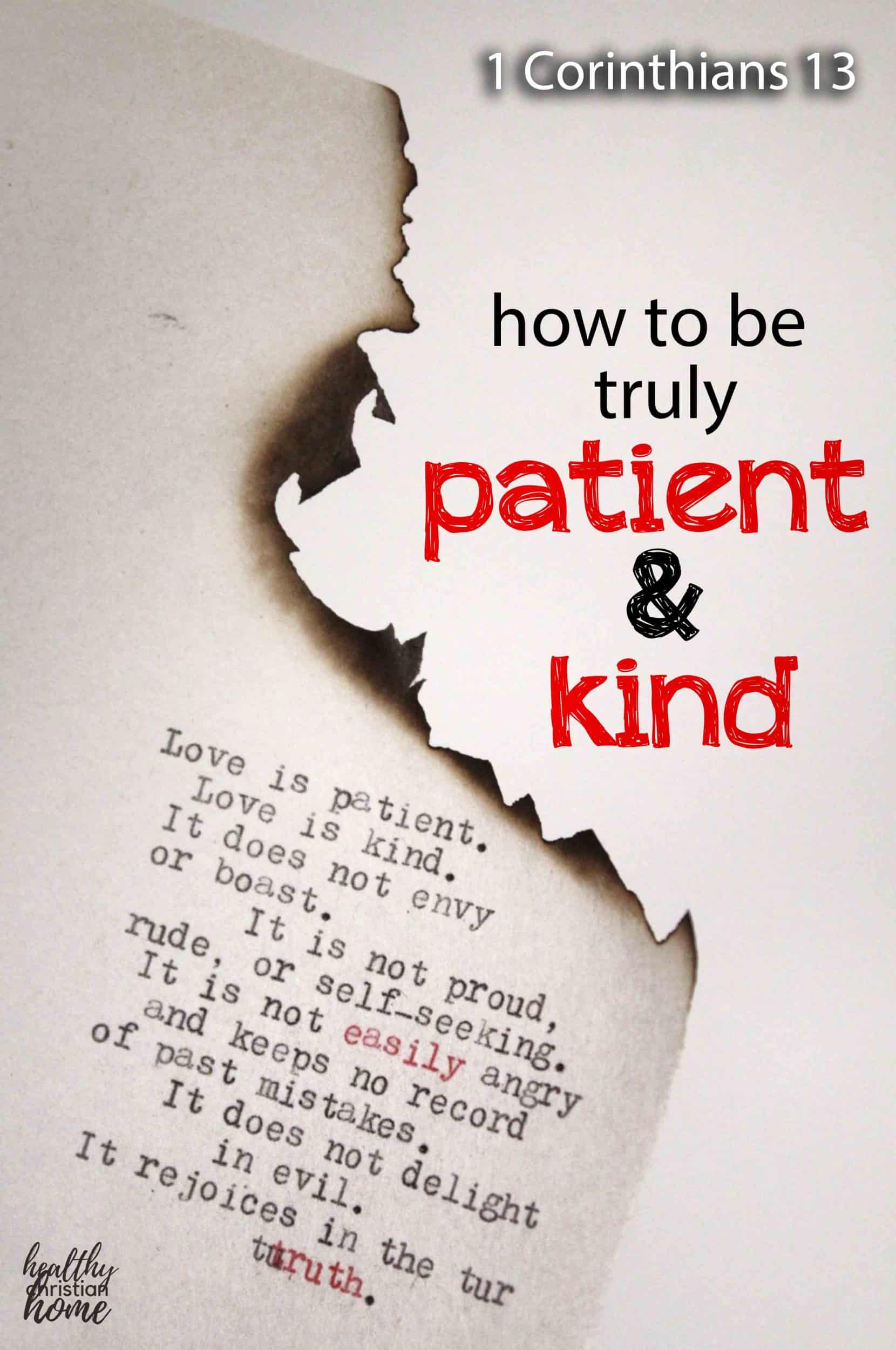True love is lacking in every society until we look to the true source of love – God. Let’s dive deep into 1 Corinthians 13 – the love chapter – and see what “love is patient, love is kind” really means.

When showing love is hard
You know the moment. Someone has just said/done something extremely hurtful to you and your adrenaline is pumping. Your flesh is screaming at you to scream something at them.
Don’t we all want — need — to be more loving with our family, friends, even our enemies? How can we respond with love toward those who have wronged us?
Only through God’s power. And thankfully, He shows us how in 1 Corinthians 13.
Oh, how I need this lesson today and every day.
Would the people in your life describe you as having a “love is patient, love is kind” attitude? Let’s dive deep into 1 Corinthians 13:4-8 to see how we can love better.
Context of 1 Corinthians 13
It’s important to look at the context of these verses on love. A major theme of this letter Paul writes to the church at Corinth is unity. There are tons of problems happening within the church due to divisive spirits and selfish attitudes.
Basically, Christians acting in an un-loving manner toward each other.
Paul’s heart is that, “there be no divisions among you, but that you be perfectly united in mind and thought” (1 Cor. 1:10).
And oh, how we Christians struggle with this concept today. Fights, drama, disagreements… they are a lot more frequent than we’d like to admit.
But at our core, I think each of us knows we are made to be loving. That’s why the outcry is so strong when we hear of any violent act in our world – we know it goes against our very nature.
But what about the small things in everyday life that tempt me to have an un-loving spirit? Why do I struggle to show love in these moments?
I’m super excited about this post, because I’ve asked Richard, my Greek-scholar husband (with a Master’s in New Testament Studies) to break down the original meanings of the words “patient” and “kind” in this verse. This will give us a deeper meaning of what it truly means to love like the Father.
Love is Patient, Love is Kind Bible Verse
Let’s look at the Bible’s most popular passage about love:
Love is patient, love is kind. It does not envy, it does not boast, it is not proud. It does not dishonor others, it is not self-seeking, it is not easily angered, it keeps no record of wrongs. Love does not delight in evil but rejoices with the truth. It always protects, always trusts, always hopes, always perseveres. Love never fails.
– 1 Corinthians 13:4-8 (NIV)
Or, you might be more familiar with the KJV version of these verses:
Charity suffereth long, and is kind; charity envieth not; charity vaunteth not itself, is not puffed up, Doth not behave itself unseemly, seeketh not her own, is not easily provoked, thinketh no evil; Rejoiceth not in iniquity, but rejoiceth in the truth; Beareth all things, believeth all things, hopeth all things, endureth all things. Charity never faileth: but whether there be prophecies, they shall fail; whether there be tongues, they shall cease; whether there be knowledge, it shall vanish away.
– Corinthians 13:4-8 (KJV)
(To compare additional translations, visit this page on Bible Gateway.)
This passage is probably the most popular wedding reading on earth, and while it definitely applies to marriage, it’s also relevant to every facet of life. Let’s dive deep into the meaning of these verses.
Related post: 12 Marriage Prayers to Invigorate Your Relationship
Meaning of “patient” μακροθυμία (original Greek)
The original Greek word for patience here is μακροθυμία, which means:
① state of remaining tranquil while awaiting an outcome, patience, steadfastness, endurance
② state of being able to bear up under provocation, forbearance, patience toward others
Greek–English Lexicon of the New Testament and Other Early Christian Literature, 3rd ed. (BDAG)
There are two parts to this word, being Makros = a long time and Thumia = a state of intense displeasure.
So basically, the word here for patient is “the state of being able to endure displeasure for a long time.”
Patience is more than just waiting calmly in a line — it’s waiting calmly when people are out of line.
Some could experience this “ability to endure displeasure for a long time” and easily respond with retaliation…or a grudge!
This grudge is a root of bitterness (Heb. 12:14-15) which can begin to grow. The stem of retaliation does not rear its ugly head for a long time, but a new root forms daily. It’s almost a sick and twisted idea of patience and unkindness.
In our human nature, patience and unkindness go hand-in-hand. God wants us to change that.
Summed up, this verse is saying:
True patience is the state of being able to endure displeasure for a long time and respond with KINDNESS. The conjunction combines the two direct objects as one. Patient AND Kind!
Can we really be patient and kind when we’re being tested? How can we endure displeasure for a long time and respond with kindness?
Let’s look deeper at the word “kindness.”
Related Post: 30 “God is Faithful” Bible Verses to Build Your Confidence
Meaning of Kind χρηστεύομαι (Original Greek)
The original Greek word for kind here is χρηστεύομαι, which means:
① be kind, loving, merciful, to someone, as you show kindness, kindness will be shown to you
Greek–English Lexicon of the New Testament and Other Early Christian Literature, 3rd ed. (BDAG)
So the word Kresteuomai is pretty straightforward – “be kind, loving, merciful.”
I want to zero in on one specific word in this definition — merciful.
True kindness is having a merciful attitude toward someone who has wronged us. It’s looking at life from their perspective and how they might possibly be thinking/feeling.
Being kind to someone who is not being kind to us for ANY length of time is an extreme challenge. (Jesus had something to say about it in the golden rule, Matthew 7:12.)
But how can we have this merciful attitude towards people who wrong us?
The key: Consider the source and ask “why?”. Let’s look at a real life example of this.
Love Is Patient, Love Is Kind Meaning (life example)
My great-grandmother died while I was in college. Our Southern family is made up of patriarchs and matriarchs who married in their teens for generations. So, my great-grandmother was quite young and was close in age to many of my friend’s grandparents.
She and I were very close, too. She taught me so much about life and I loved her deeply. The day she passed away, my admiration for her was felt in the tears that poured from my eyes on my way to class.
A friend saw my red face and bluntly asked, “What’s wrong with you, Harp?” I said, “My great-grandmother passed away this morning.” Instead of extending sympathy, he responded by questioning my sadness with a look of impatience on his face.
“She’s just your great-grandmother?”
My state of being able to endure displeasure for a long time was immediately challenged, and a root of bitterness almost became a mark across his face. But as I immediately considered the source, the root actually went away (and so did my burst of anger).
I remembered that this young man was the product of foster care and only barely knew one sister. He did not know parents, grandparents, and especially not great-grandparents.
God helped me show mercy in this moment, which was translated as kindness as I responded with a smile to someone who just couldn’t understand.
Read Next: 20 Memory Verses for Kids About God’s Love
So, what about you? Who are you struggling to be “patient and kind” with?
- Is a friend or acquaintance treating you badly? Take their past circumstances into account. Past wounds often translate into poor behavior patterns later.
- Has your spouse had a long day or is their response out of the ordinary? You can show mercy by patiently asking, “Is everything okay? How did your day go?”
- Does the person you are struggling with have any stressors in their life? Maybe there are issues of health problems, finance, work, and life that are causing them to act un-lovingly.
By responding to others with mercy, at the very least the conversation should de-escalate. At best, that person will be amazed at your loving response and want to know more about the God you serve.
This makes me think of the following verses:
Bless those who persecute you; bless and do not curse them… repay no one evil for evil, but give thought to do what is honorable in the sight of all. If possible, so far as it depends on you, live peaceably with all. Beloved, never avenge yourselves, but leave it to the wrath of God, for it is written, “Vengeance is mine, I will repay, says the Lord.” To the contrary, “if your enemy is hungry, feed him; if he is thirsty, give him something to drink; for by so doing you will heap burning coals on his head.” Do not be overcome by evil, but overcome evil with good.
– Romans 12:14, 17-21 (NIV)
Now that we’ve looked in-depth at the “love is patient, love is kind” portion, let’s examine the other characteristics of love found in 1 Corinthians 13. Each of these facets upholds our ability to be patient and kind in any given situation.

Love does not envy or boast
Pride and jealousy are often precursors to a lack of love, and prevent us from being merciful. When we want to be better than those around us or struggle with being content, showing love is hard to do.
Remember Proverbs 14:30, “A heart at peace is life to the body, but envy rots the bones.”
Pray for God to help you have a humble, contented heart – wherever you are in life. Ask Him to help you realize “it’s not all about me.” This attitude will help you love others more fully.
Love is not rude or self-seeking
At the root, a lack of love comes down to selfishness. When we are rude, say hurtful words, when we neglect others – it’s often because we are focused on ourselves. Plain and simple.
When we are self-seeking, our #1 focus is on our own personal comfort. This makes it impossible for us to implement what we talked about earlier in regards to being patient and able to endure displeasure for a long time and respond with kindness.
Love is not easily angered and keeps no record of wrongs
To my shame, there have been plenty of times I’ve allowed anger to overtake me. This often tempts me to bring up the past mistakes of others.
True love gives others the benefit of the doubt (remember our discussion on mercy?) and realizes that there is usually a reason for offenses when they happen. Love tries to see life from the other person’s perspective and not jump to conclusions too quickly.
I love James 1:19-20, “My dear brothers and sisters, take note of this: Everyone should be quick to listen, slow to speak and slow to become angry, because human anger does not produce the righteousness that God desires.”
Love rejoices in the truth, not in evil
Aside from love, truth is one of the top virtues to strive for in the Christian life. Sadly, so many today are more concerned about personal comfort than a pursuit of truth, no matter the cost.
When you truly love someone, you love them enough to tell them the truth (even when it hurts). Real love can never be happy about evil actions (for example, a loved one living in sin). Love tells the truth, at all times. “Dear children, let us not love with words or speech but with actions and in truth” (1 John 3:18).
Love protects, hopes, trusts, perseveres
I love these final descriptive words about love in 1 Cor. 13:7, “It always protects, always trusts, always hopes, always perseveres.” Each of these words speaks loudly of commitment.
Real love is committed love. It doesn’t give up when times get tough – it is unconditional. It is unchanging.
The worldly perspective of love is based on feelings, and when feelings change, the “love” or relationship is dissolved. This is not the Biblical example of love.
True love is way more than feelings – it is doing what’s best for another person, and it is a conscious choice. The feelings usually follow suit.
Love never fails
Oh us humans, we fail plenty. No matter how hard we try, we cannot love people perfectly.
This is why God is the very definition of love. His love is the only love that can truly never fail.
This verse reminds us of the reality that GOD IS LOVE. And He is the only one who informs and empowers our love for others.
I love the lyrics of this “love is patient, love is kind” song:
Love is patient, love is kind,
It does not envy or speak in pride,
It does not seek its own reward:
Oh, that’s how You love me Lord
It always hopes and perseveres,
It covers over a wealth of sins,
It shuns all evil, delights in truth:
Oh, I want to be like You.
I’m in love with a King, I’m in love with a Friend,
And whatever I do this love never ends.
He’s for me, He pleads for me,
Pours out His life for me;
What more do I need?
Amazing love!
– Lyrics by Stuart Townend
Do you struggle with patience and kindness? What do these verses mean to you?
PIN IT!


Awesome!!!
To God Be the glory!!
Excellent thoughts! Thank you!!
Thanks for reading, Ansley!
Thank you for these words of wisdom. It was a dark day today and you shed some light on matters.
Much love headed your way. God bless.
Much appreciation for sharing your thoughts and analysis on such a critical biblical passage. May love shine on you forever.
thank your Richard for explaining this bible verse. I printed this out.
Love is kind, love is patient has such a deep meaning and I am glad you have explained this for us in practical way.
This one of the most important bible verse.
The bible is not easy to read and understand. I am so glad you have explained this simple words.
Maybe God bless everyone who is reading this blog post and help them love their neighbours!
Thanks for your kind words.
Thank you for breaking this down for me ! I really appreciate
God bless you for writing this. It makes so much sense and we can take this and apply it. God is merciful and therefore we should be too.
Thanks for putting it into the perspective of dealing with tough people so to speak. Nothing like repaying evil with good makes you feel so good!
Incredible post! It’s amazing how much depth and meaning can be found in just a few verses. Your analysis of 1 Corinthians 13:4-7 provides a deeper understanding of what love truly means, beyond just the surface level. I especially appreciated the practical examples you provided, they really drive home the message. Thank you for sharing this valuable insight and encouraging us to reflect on the meaning of love in our own lives.
Normally, I do not comment on posts that I read, but this was so powerful and eye-opening. Thank you so much for sharing this.